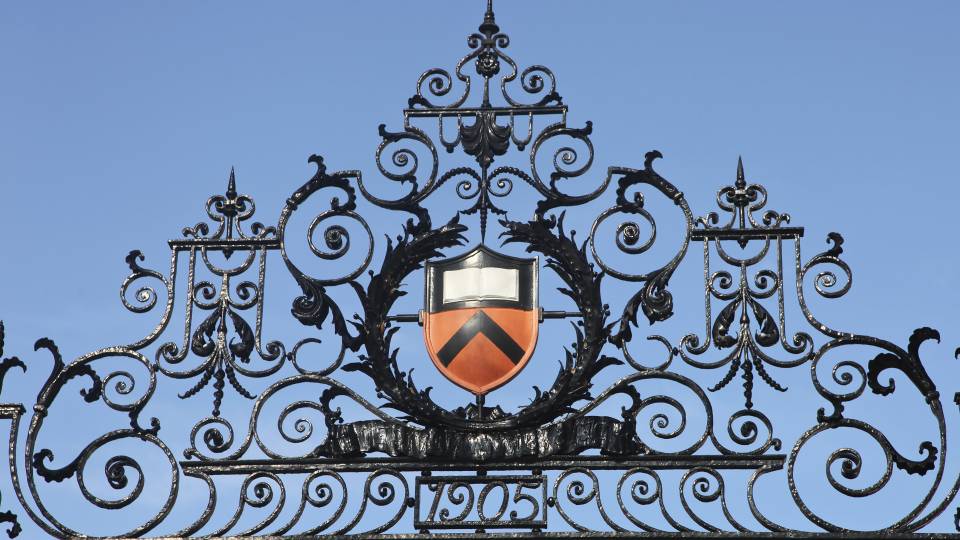The premiere guests on the "We Roar" podcast, from left to right, Jeremy Adelman, Kara Amoratis, Christopher L. Eisgruber and Kirsten Traudt.
Princeton University has launched a new podcast series to share the personal stories and expertise of students, faculty, staff and alumni during the COVID-19 pandemic. The “We Roar” podcast will offer short meditations by a wide range of Princetonians as they continue their work and daily lives through one of the watershed moments of our time.
Topics will include cutting-edge research in the fight against COVID-19; stories from the forefront of medicine, government and the private sector; the ways in which everyday life has been altered for Princeton students and faculty; how research and teaching are being reimagined through distance learning; and how Princetonians continue to live out the University’s informal motto, “In the Nation’s Service and the Service of Humanity.”
In one of four episodes released today, President Christopher L. Eisgruber describes the negotiations behind the University's decision to send students home for the remainder of the spring 2020 semester. "I'm confident that by getting our students off the campus we were able to keep the infection numbers in our community small," he said. "But boy, the last thing you want to have to do as the president of a university is put a stop to all that activity that people enjoy so much and send them home. ... It was a difficult day that I will never forget."
New episodes will be released on Tuesdays and Fridays. The first four episodes are available for free on Apple Podcasts, Spotify and other podcast platforms.
“At a time when our campus community has been scattered across the globe, ‘We Roar’ is a vehicle to stay engaged with our fellow Princetonians and share our experiences through the pandemic,” said Margaret Koval, a 1983 graduate alum and director of special projects for the Office of Communications. “COVID-19 has changed the way we live and work, how we teach, how we do research. For some, their scholarship has taken on a new urgency. ‘We Roar’ will highlight all the ways in which our students, faculty, staff and alumni are rising to the occasion and adapting to an unprecedented crisis.”
The premiere guests on "We Roar" also include Jeremy Adelman, the Henry Charles Lea Professor of History and director of the Global History Lab; Kara Amoratis, associate director of International Travel Safety and Security; and Kirsten Traudt, Class of 2020.
Future guests include former U.S. Senate majority leader Bill Frist, Class of 1974; Chitra Parikh, Class of 2021, Undergraduate Student Government president; Rebecca Lazier, a senior lecturer in dance in the Lewis Center for the Arts and acting director of the Program in Dance; and Alan Blinder, the Gordon S. Rentschler Memorial Professor of Economics and Public Affairs.

Jeremy Adelman
Episode 1 – Invading the Screen: The New Urgency of Distance Learning
When coronavirus forced Princeton to close its campus classrooms in favor of remote teaching, Professor Jeremy Adelman drew upon a decade of pioneering work in distance education. As director of the “Global History Lab,” Adelman has experimented for years with ways to keep students connected and engaged online. His spring undergraduate course at Princeton is on-topic, too, focusing on globalization since 1820 and offering historical observations of human and environmental interdependence.

Kirsten Traudt
Episode 2 – Taking the Long-View of History: COVID-19 Through the Lens of Ancient Pompeii
Like college seniors across the nation, Princeton classics concentrator Kirsten Traudt, Class of 2020, is finishing her coursework online under the “new normal” rules of social distancing. It’s an unprecedented situation. At the same time, she’s finding that a 2,000-year-old account of the eruption of Mount Vesuvius provides thought-provoking perspective.
Episode 3 – Bringing Students Home: Navigating an Unprecedented Crisis
As coronavirus spread beyond China, and Princeton recalled its overseas students, another kind of crisis emerged when commercial air traffic was interrupted around the world. Peru, where seven Princeton students were studying this spring, blocked even emergency charter flights from taking off and landing. Kara Amoratis, Princeton’s associate director of International Travel Safety and Security, describes the unfolding events as she led efforts to bring students home.

President Christopher L. Eisgruber will greet attendees at the Oct. 23 Welcome Kickoff virtual event of Forward Fest and is looking forward to their engagement during the Q&A sessions.
Episode 4 – Challenging Conventional Wisdom: President Eisgruber Confronts Coronavirus
Friday, March 13, 2020, stands as a singular day in Princeton’s history — it was the last day of normality in an academic year disrupted by the COVID-19 virus. President Christopher Eisgruber describes the intense consultations behind the decision to disperse students from campus, move teaching online and suspend regular operations.































